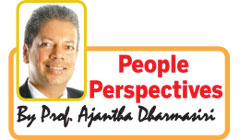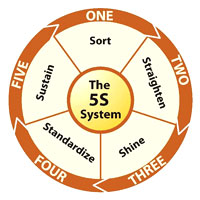Five S for the mind
 I
spoke on 'Five S for the Mind' at the Annual Five S Conference,
organized by the Sri Lanka Association of Quality and Productivity
recently and highlighted the need to focus on the mind over matter.
Today's column is a summary of what I shared. Better housekeeping,
higher orderliness and enhanced productivity are some of the ways the
benefits of a popular approach known as 'five S' have been described. It
is no stranger to the Sri Lankan workplace. I think it has more depth
and breadth than that. I
spoke on 'Five S for the Mind' at the Annual Five S Conference,
organized by the Sri Lanka Association of Quality and Productivity
recently and highlighted the need to focus on the mind over matter.
Today's column is a summary of what I shared. Better housekeeping,
higher orderliness and enhanced productivity are some of the ways the
benefits of a popular approach known as 'five S' have been described. It
is no stranger to the Sri Lankan workplace. I think it has more depth
and breadth than that.
 'Five
S' originated in Japan, and stands for five Japanese words that start
with the letter 'S': Seiri, Seiton, Seiso, Seiketsu, and Shitsuke. An
equivalent set of the five 'S' words in English have likewise been
adopted by many, to preserve the 'Five S' acronym in English usage.
These are: Sort, Set, Shine, Standardize, and Sustain. 'Five
S' originated in Japan, and stands for five Japanese words that start
with the letter 'S': Seiri, Seiton, Seiso, Seiketsu, and Shitsuke. An
equivalent set of the five 'S' words in English have likewise been
adopted by many, to preserve the 'Five S' acronym in English usage.
These are: Sort, Set, Shine, Standardize, and Sustain.
The first stanza of the revered text, the Dhammapada states, mano
pubbaagma dhamma, mano setta manomaya. This essentially means that the
mind is the forerunner for all things. While its supremacy has always
been undisputedly accepted, 'what is mind?' has been a perennial
question.
Philosophers strive to describe it while psychologists struggle to
define it. As one relatively simpler definition says, mind is the human
consciousness that originates in the brain and is manifested especially
in thought, perception, emotion, will, memory, and imagination.
Why does the mind need Five S? This has been a question in my mind
for a while. Removing clutter from the workplace is fine but more
clutter remains in the mind, in the form of negative emotions,
inaccurate perceptions and false opinions. Even though Five S has been
successfully implemented in many Sri Lankan workplaces, the depth it
contains in making the participants disciplined has not been adequately
captured.
Let's discuss each S in detail.
Seiri (Sort) is the starting point. Typical workplace activities
include going through all tools, materials, and so forth in the plant
and work area. Keeping only essential items and eliminating what is not
needed, prioritizing things according to the need and keeping them in
easily-accessible places, are other key actions. Everything else is
stored or discarded.
The deep relevance of Seiri to the mind is purposefulness. To ensure
clarity over clutter with 'right seeing' (Samma Dhitti), one needs to
identify positive thoughts, constructive emotions and unbiased
perceptions with a clear purpose in mind. This is much more difficult
than sorting things in a workplace.
Seiton (Set) typically means arranging the workplace, equipment,
parts, and instructions in such a way that the work flows free of waste
through the value added tasks with a division of labour as necessary to
meet demand. It follows the practice that 'everything has a proper
place'. It is all about efficiency.
The deep relevance of Seiton to the mind is prioritizing. It needs
focusing on value creation. Connecting thoughts in a logical manner with
proper analysis is the need. It in fact helps oneself to focus on tasks
linked to targets in the context of overall purpose. What is connected
to the purpose has to be a priority.
The rest have to be 'set aside' to be done only when time permits.
Seiso (Shine) involves cleaning the workspace and all equipment, and
keep them organized. In a typical factory, at the end of each shift,
clean the work area and be sure everything is restored to its place.
This step ensures that the workstation is ready for the next user and
that order is sustained.
The deep relevance of Seiso to the mind is purity. This is where the
spiritual dimension looms large. Pure thoughts devoid of malice,
jealously and other negativities is what is needed. A shining mind is a
spiritual mind empathizing with others compassionately.
Seiketsu (Sustain) is all about uniformity and consistency. In a
typical workplace, uniform procedures need to be ensured throughout an
operation to promote interchangeability.
Seiketsu can also be viewed as 'conformance to consistent clean-up'.
It defines the standards by which people must measure and maintain
'cleanliness'. Seiketsu encompasses people and environmental
cleanliness. Personal tidiness can be a good starting point.
The deep relevance of Seiketsu to the mind is perseverance. So many
start-ups might end up half way through without proper completion. A
mind that is geared towards perseverance will ensure continuity of a
recommended habit, preferred value or a best practice. One needs
determination and dedication to sustain noteworthy initiatives.
Shitsuke (Standardize) refers to ensuring the disciplined adherence
to the four Ss. It assists in preventing a possible backsliding to where
things were before the implementation of five S.
The key word here is discipline. It denotes practising five S as a
way of life. As the Japanese say, the emphasis of Shitsuke is
elimination of bad habits and the constant practice of good ones. When
true Shitsuke is achieved, people would keep things naturally, without
reminders and warnings.
The deep relevance of Shitsuke to the mind is pro-activeness. With a
proactive mind, purposeful, prioritized, pure actions can be continued
with perseverance. In essence, it sums up the overall application of
five S to the mind.
Five S for the workplace can be applicable in a deep way as five S
for the mind. In such an approach, it can even be called five Ps.
Purposefulness, prioritizing, purity, perseverance and pro-activeness.
Sri Lankan managers can embrace the five Ps and then engage in five
Ss so that mind and matter can be organized in a better way.
The sad state in some of the Sri Lankan workplaces is that five S has
become an award winning exercise overly focusing on the workplace
forgetting the deeper aspect of mind. I would argue that five S should
begin with mind and then applied to matter.
The writer can be reached through [email protected] or
www.ajanthadharmasiri.info
|

